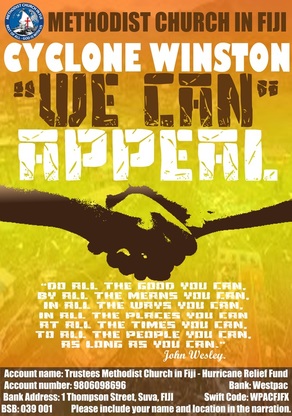The Methodist Church in Fiji has launched an appeal for clothing, kitchen items and bedding for church members suffering in the aftermath of Cyclone Winston, the record-breaking Category 5 storm that devastated parts of the country last Saturday.
The largest church in Fiji is urging people in its 22 unaffected divisions to share whatever they have with those in the 29 divisions devastated by what it called the second most powerful storm in the world.
The church will dedicate its offerings from the traditional Harvest Sunday services on 6 March to the relief efforts and has opened a special bank account to collect relief funds.
With winds gusting up to 325km/h and waves up to 12m high, Cyclone Winston was the worst Category 5 storm in Fiji’s history. It flattened many villages in low-lying regions, reducing churches and schools to rubble and leaving tens of thousands of people without water, food or a roof over their heads.
“As of today there are 45,000 people in 760 evacuation centres around the country – a fifth of the population,” said James Bhagwan, Secretary for Communication and Overseas Mission of the Methodist Church in Fiji.
“There have been 42 deaths, there are 45 people in hospital, and 122 injuries have been recorded. This is the biggest disaster that we are facing.”
Bhagwan said the church’s disaster response committee wanted to “fill in the gaps” of current relief efforts of the government and Red Cross.
“We are providing a secondary response because there is so much coming out as first response, so rather than doubling up we want to provide medium and long-term responses including providing trauma counselling,” Bhagwan said.
“We Fijians are resilient – we pick up and we move on – but our concern is that once the immediate wave of responding calms down, people will continue to be hit by shock and trauma of what they’ve gone through.”
Bhagwan said the church’s international partner, Uniting World, would assist its relief efforts, as would UMCOR, the American Methodist disaster relief organisation.
“We have a US missionary based here who specialises in disaster trauma counselling, so we are doing as much as we can to train people who are going out into the field to know how to respond in the long term.”
As well as meeting individual needs, the church’s second priority is to repair the many churches, church halls and church schools that have been damaged.
“In northwestern Fiji in the Yasawa islands division, five churches have been completely destroyed, and other churches around the country have been damaged or completely destroyed,” he said.
“Also church halls, which are used for refuge areas or evacuation centres as well as by the church, need to be repaired.
“We’ll also have to look at how we can raise funds to fix our schools.
“School children have had one week of disruption already and there may be another two weeks.
“If we can get children back to school, a sense of normality slowly comes back in and they can continue their studies because they have exams coming up.”
Bhagwan said he and his family in Suva were only “lightly touched” by the Cyclone, with only electricity disruption and trees downed.
“But many of us here haven’t experienced this type of storm for some time. For my children it was the first time they had experienced something of this magnitude,” he said.
“We are people who smile and try and pick up the pieces as best we can, but we know that behind the smiles are people who are hurting, who are struggling to find hope.”
To ensure this “deeply religious people” regained hope, it was important to find new Bibles and hymn books to replace those lost in the Cyclone.
“As well as the basic necessities of physical life, we have to look and see if we can also provide the basic necessities of spiritual life, which give people strength to carry on,” he said.
Solomone Duru, the General Secretary of the Bible Society in the South Pacific (BSSP), estimated that a minimum 30,000 to 40,000 Scriptures were needed.
“There is a small print run of the old version expected but it is the new version that most people, especially Methodists, would be looking forward to,” he said.
“Corrections for that version are almost complete … The challenge now is our limitation in cash to get a sizeable quantity.”
Duru said there was also a great need for building materials.
“It is a terrible sight to view pictures and hear stories of communities and villages who suffered. Whole villages and even exotic resorts (like Namena Island) were totally uprooted and thrown to the sea. Many were fortunate because they were hit during daytime.
“Nasinu village, where BSSP ran a community development programme some years back, was totally flattened.
Email This Story
Why not send this to a friend?
